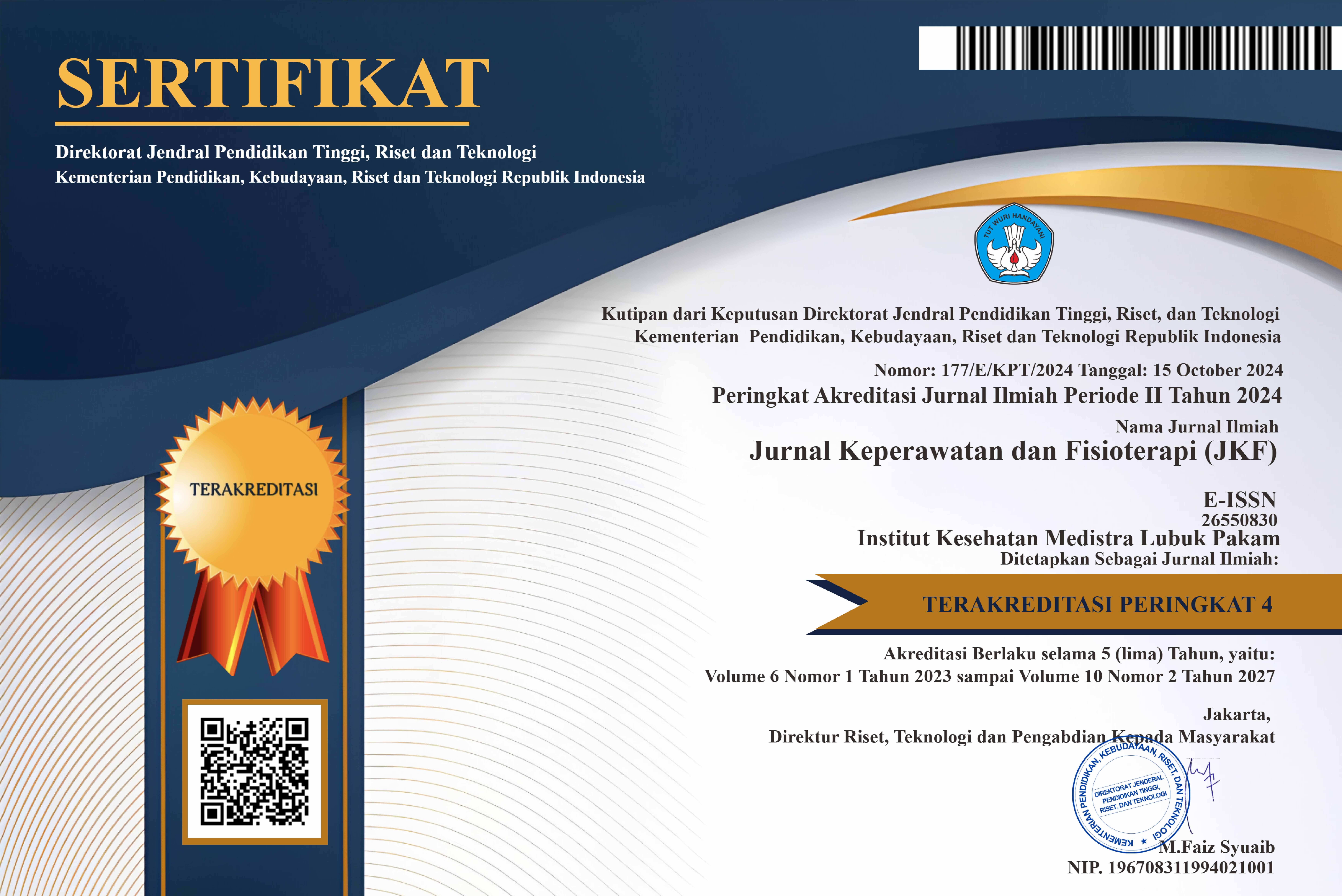Implementation of Occupational Safety for Waste Processing Officers for Hazardous and Toxic Materials (B3)
DOI:
https://doi.org/10.35451/jkf.v7i2.2675Keywords:
Occupational Safety, Waste Management, Waste Hazardous and Toxic Materials (B3)Abstract
The implementation of occupational safety principles plays a very important role for officers who handle B3 medical waste, considering that they interact directly with hazardous and toxic materials. This effort aims to create a safe, healthy, and pollution-free work environment, so as to minimize the occurrence of work accidents and health problems due to exposure in the workplace. This study uses a qualitative approach with the aim of exploring in depth the implementation of occupational safety in B3 medical waste processing officers at the Pagar Merbau Health Ceter, Deli Serdang Regency. There were three informants in this study, and data were obtained through observation and in-depth interviews. The results of the study showed that the implementation of occupational safety in the field has not been running optimally. One of the main obstacles is the lack of consistency of officers in using Personal Protective Equipment (PPE). Based on these results, it is recommended that K3 officers be more intensive in providing direction and supervision of the use of PPE and the implementation of work procedures according to applicable standards. This is important to ensure the safety and comfort of work for officers involved in the management of B3 medical waste.
Downloads
References
Permenkes RI. Pusat Kesehatan Masyarakat (Puskesmas). Peraturan Menteri Kesehatan Republik Indonesia Nomor 75 Tahun 2014.
Kementerian Kesehatan Republik Indonesia. Profil Kesehatan Indonesia 2021 [Internet]. Jakarta: Pusat Data dan Informasi Kemenkes RI; 2022 [diakses 2025 Apr 9]. Tersedia pada: https://www.kemkes.go.id/downloads/resources/download/pusdatin/profil-kesehatan-indonesia/ProfilKesehatan-2021.pdf
Lubis S. Penggunaan Alat Pelindung Diri (APD) dalam Penanganan Sampah dan Linen di Rumah Sakit Prima Husada Cipta Medan Tahun 2019 [skripsi]. Medan: Politeknik Kesehatan Kemenkes Medan; 2019. Tersedia pada: http://ecampus.poltekkes-medan.ac.id/jspui/handle/123456789/1372
Sepriani D. Hubungan Penggunaan Alat Pelindung Diri Terhadap Workplace Injury Pekerja Bagian Produksi PT. Socfin Indonesia Tanah Gambus [skripsi]. Medan: Universitas Islam Negeri Sumatera Utara; 2021.
Lubis RM, Harahap A, Ahmad H. Faktor yang Berhubungan dengan Perilaku Penggunaan APD pada Petugas Pengelolaan Limbah B3 di Rumah Sakit Umum Pandan Tapanuli Tengah dan Kota Sibolga. Media Publikasi Promosi Kesehatan Indonesia. 2023;6(10):2019–26. doi:10.56338/mppki.v6i10.4164
Annisa A. Evaluasi Pengolahan Limbah Medis Bahan Berbahaya Beracun (B3) di Rumah Sakit Umum Daerah Cut Meutia Kabupaten Aceh Timur [skripsi]. Aceh Timur; 2020.
Sugiyono. Metode Penelitian Kuantitatif, Kualitatif, R&D. Bandung: Alfabeta; 2020.
Abriyadi, Irawati I, Kafit M, Andi. Faktor-Faktor Yang Berhubungan Dengan Perilaku Safety Petugas Kesehatan Dalam Pengolahan Sampah Medis Di Puskesmas Tiban Baru Kota Batam Tahun 2022. 2023.
Salami IR. Keselamatan dan Kesehatan Lingkungan Kerja. Yogyakarta: Universitas Gadjah Mada; 2016.
Kursani E. Penerapan Sistem Manajemen Kesehatan dan Keselamatan Kerja (SMK3) di PT. Ahmadanis. Higeia Jurnal. 2021;1(1):30–5.
Erlanda, Fikri, Kartika. Pengolahan Limbah Medis Padat. Bandung: Pustaka Setia; 2019.
Annisa A. Evaluasi Pengolahan Limbah Medis Bahan Berbahaya Beracun (B3) di Rumah Sakit Umum Daerah Cut Meutia Kabupaten Aceh Timur [skripsi]. 2020.
Setiawan H. Analisis Efektivitas Penerapan Standar Operating Procedure (SOP) Pada Departemen Community dan Academy Kesehatan. 2018.
Rahmatullah W. Analisis Pelaksanaan Standar Operating Procedure (SOP) Pengolahan Limbah Medis dan Non Medis di Rumah Sakit Jogja Internasional Hospital. 2020.
Welliana M, Efendi I, Aini N. Analisis Pengelolaan Limbah Medis di Puskesmas Kabupaten Aceh Timur. J Healtcare Technol Med. 2022;8(1):216–27.
Adrian T, Copriady J. Implementasi Manajemen Operasional Limbah Medis Padat di Rumah Sakit Chevron Pacific Indonesia. 2021.
Downloads
Published
Issue
Section
License
Copyright (c) 2025 Irmayani Irmayani, Rosita Ginting, Jul Asdar Samura, Anggi Isnani Parinduri, Sri Melda Bangun, Dewi F Handayani

This work is licensed under a Creative Commons Attribution 4.0 International License.
Copyright in each article is the property of the Author.


























